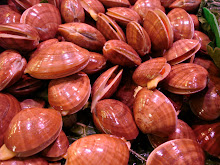Here is the problem: our vegetarian entree sucks. It isn't just "not our best dish". Its not disgusting, but it also isn't a dish and isn't anywhere near the same level of execution for the rest of our food. It's really a platter. I know one thing vegetarians hate a lot, and that's the veg entree which is simply a collection of sides. Here is what we put on our veg platter right now:
-A slice of eggplant parmesan
-Sliced roasted peppers (the veg side for the lamb dish)
-Sauteed artichokes (the veg half of our squid and artichoke dish)
-Sauteed chicory (the veg garnish for our fava soup with chicory)
-A breaded and deep fried mini mozzarella sandwich (yes, we flour, egg, and breadcrumb bread)
-Sauteed broccoli rabe (veg side of another dish, cooked in the same way as the chicory)
-A beaten egg mixed with some crunchy dried sweet pepper and cooked in the oven as a kind of souffle-thing
-Sauteed swiss chard (again, cooked in the same way as the other two green things, and also a side)
We heat all the veggies up in the microwave when an order comes in. Yum!
 Saturday night we had an abnormally large number of these ordered. This is one dish that isn't made on the line, which means that chef is the one to assemble everything. Saturday, since I was there she delegated everything but the side veggies to me (parmesan, egg, and sandwich), and then complained to the front of house that they need to sell fewer of these because it takes a lot of time split between two people to assemble this dish. All the components do mean that it takes a lot of time to assemble one order, but I don't understand why we have the dish on the menu at all. Our most complex entree has five parts, and yet here we are with eight, to the point that they can't even all fit cleanly on our biggest platter. Furthermore, it doesn't even make any sense. There is no focal point of the dish, though on the menu it always lists "eggplant parm with other seasonal veggies", so maybe the eggplant parm should be featured, but it is just presented as one item in this smorgasbord.
Saturday night we had an abnormally large number of these ordered. This is one dish that isn't made on the line, which means that chef is the one to assemble everything. Saturday, since I was there she delegated everything but the side veggies to me (parmesan, egg, and sandwich), and then complained to the front of house that they need to sell fewer of these because it takes a lot of time split between two people to assemble this dish. All the components do mean that it takes a lot of time to assemble one order, but I don't understand why we have the dish on the menu at all. Our most complex entree has five parts, and yet here we are with eight, to the point that they can't even all fit cleanly on our biggest platter. Furthermore, it doesn't even make any sense. There is no focal point of the dish, though on the menu it always lists "eggplant parm with other seasonal veggies", so maybe the eggplant parm should be featured, but it is just presented as one item in this smorgasbord. Last night I tested the waters. Just with us cooks, not chef. We were discussing prep for Tuesday, and I mentioned that we needed more eggplant parm. I then also said, "you know, I'm not fond of our veg dish." They asked why, and I explained how its a platter, a collection of sides, not a proper entree. Keiji looked at me and said that with just vegetables, what could we expect to do? I replied that there are vegetarian entrees out there that we could do, and that was the end of the conversation. However neither of them stood up to defend the dish, and I think they may have just been confused as to why I cared.
Hence my goal: Get the restaurant to start serving a proper veggie entree. I think that while it is ambitious (a stage convincing the restaurant to change a dish), I think it might be doable. The chef dislikes putting together what they currently have, it isn't the favorite of the owner or chef's mother or anything sentimental, and I don't think anyone is proud of it or anything. However my work background gives me at least a little bit of authority on the matter of vegetarian dishes, and so I'm going to leverage that all I can.
But if I say that we should change it, I think then that I need to have a good alternative to propose. So I'm going to try playing with ideas and developing something this week that I can bring in as an alternative. I'm going to stay conservative though, and probably try to keep on the theme of eggplant parmesan, but by elevating it in some way such that it actually fits the context of a fine dining restaurant and can hold its own as an entree. I'll keep you updated on my progress!










